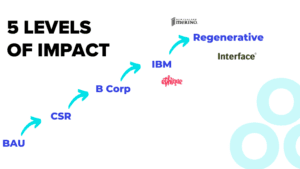

On the assessment, you need to reach a minimum score of 80/200 points. It’s worth reflecting that the median score on the first attempt is 50 points, so to even get to 80 you are doing some good work.
We typically find that you need to do ok across all 5 or really well in 2 to reach that standard.
Who can Certify?
B Corp Certification is open to any for-profit businesses of any legal structure that has been in operation for more than 12 months, of almost any size (really big ones need to go talk to B Lab to see if they can), from almost all geographies (sorry Russian and Belarussian peeps) and from most industries.
B Corp Certification currently only excludes certain existentially risky industries, such as arms dealers for example, but not single-use consumable items or companies that might have a shady past.
It is key to remember that the B Corp assessment is a measure of your operational goodness, not the core product that you make. So there is no guarantee that the product a company is making is recyclable just because it is a B Corp.
If we chose to exclude all companies that had a negative environmental impact, few if any companies would certify.
That being said, you can be recognized for creating more social and environmental impact than you are required to through what is called an Impact Business Model.
Patagonia and Ethique are two great examples of such.
B Corp is by no means the silver bullet to all the world’s crises, BUT it’s a bloody great start. It is the world’s most holistic ESG framework that is also independently audited and verified.
So should Nespresso even exist let alone B a B?
Well, this is an interesting question. Who gets to decide whether any business gets to exist?!
It’s a question I pose to our MBA students at the University of Canterbury where I co-teach the programme “Creating Impact Led Enterprises” and it’s not an easy one to answer.
I personally struggle to see how the Pooch Selfie has the mandate to exist. I posted recently about how I felt that Zuru’s latest attempt to destroy the planet was pretty stupid.
What about Coca Cola? They basically make fizzy pop that rots your bones, gives you heart disease and diabetes and sucks water out of the ground at a massive rate.
What about Eagle Protect? NZ’s first B Corp – As Steve Ardagh their CEO admits, they make single-use disposable gloves that 100% end up in landfills.
What about airlines, cars, and infrastructure companies?
How about we go further back in history. Not many people know that IBM, VW and Hugo Boss had their success built on the back of the Nazis.
The list goes on.
The challenge is we live in a consumer-driven society that we all take part in and benefit from but at the expense of others and the planet.
Don’t forget we live in a world where 50 years ago your GP might have recommended you smoke more as a preventative health measure…
So where does this leave us?
I think it’s clear that we need to have better conversations about what serves us and the planet.
But let’s not forget that the lightbulb💡 was invented under candlelight 🕯. There are plenty of industries that need to be better, and some that maybe shouldn’t even get to exist. But who gets to decide that and when.
And how do we empathetically help people out of these industries and into a regenerative system that enables community and restores the environment?
If a committee today decided that Nespresso should be shut down what happens to all those people currently working there?
B Corp is just the start…
Since I started Grow Good in 2015 I have been dedicated to making the world a better place for all of us. I recognise that we need to rapidly transition to a better way, a better system.
As I said, B Corp is not a silver bullet. It’s a start of a journey for us all to work out how business can become truly regenerative:

It’s about mindset and intent and what we do from here.
The best way to do that? Get more businesses to independently verify their impact by getting B Corp Certified regardless of where they have come from.
I don’t know the full ins and outs of Nespresso but I’d imagine there is a team there now that gets this stuff and will be working hard to make a change.
Yes, Nestlé is clearly not a business that operates as a genuine force for good and they have heaps of areas to improve.
But this is a massive step in the right direction.
Doing good is contagious, so hopefully, this spreads to other business units and over time it creates more positive change across Nestlé.
It’s worth noting that apparently, it took Nespresso 3 years to get the business Certified. So in 3 years of work they got just over the 80/200 threshold for certification. You can see the full impact assessment here.
For me, it’s better that they are in the B Corp community.
I’m more hopeful that as part of a community of businesses that are pushing each other to B Better that they will raise their game.
Here’s hoping that Nespresso kicks the pods in the future and has a better supply chain and ultimately becomes a better B Corp.
I’ll leave it to Rose Macrcario, former CEO of Patagonia to sum it up for me.
“The B Corp movement is one of the most important of our lifetime, built on the simple fact that business impacts and serves more than just shareholders – it has an equal responsibility to the community and to the planet.”
Rose Marcario
Former CEO
Patagonia

Last week B Lab Europe announced that they were “thrilled to welcome Nestlé Nespresso SA, into the B Corp movement, joining over 120 companies in the coffee industry. Nespresso is certified globally with a B Impact score of 84.3.”
I shared this post on my feed and it got some interesting replies both supportive:
And those that felt something was seriously off:
So it made me think about the B Corp framework and reflect on whether this is a good thing or not.
For transparency, I had no involvement with their B Corp journey, I don’t generally support Néstle or any of its products as I prefer to buy local and from independent suppliers where possible and I don’t use Nespresso pods – indeed, I never have as I don’t even drink coffee!
For some background let’s just explain what B Corp Certification is and what it entails.
Certified B Corps are a new form of business that seek to balance purpose and profit.
This means that rather than solely focusing on profit maximisation, they consider the impact of their operations on their workers, customers, suppliers, community, and the environment.
B Corps are leaders of a global movement of business as a force for good and to get certified you must meet the highest verified standards of transparency and accountability around your social and environmental impact.
B Corp Certification is a positive screening tool. You get rewarded for the operational good that you are doing, not penalised for the bad.
The B Corp BIA or Impact Assessment looks at 5 sections of the business and a disclosure questionnaire: